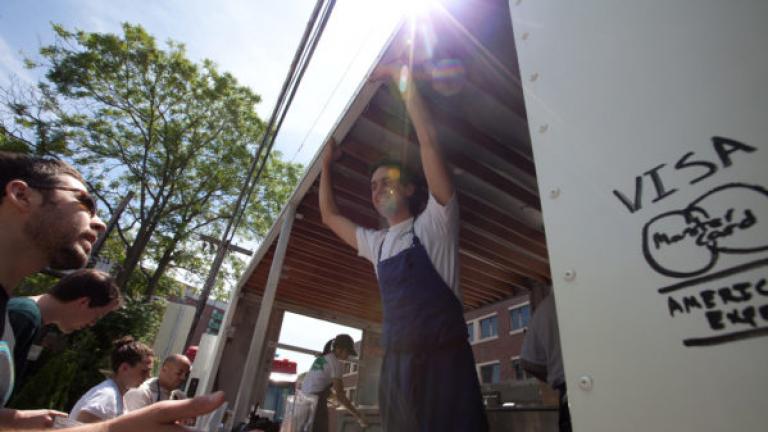
Ayr Muir is the founder and CEO of Clover Food Lab. After getting his BS and Masters in Materials Science and Engineering at MIT, and an MBA from Harvard Business School, Ayr shifted his focus to sustainable agriculture and food production. Clover Food Lab is a fast-food chain that sources from local farms and uses energy-efficient practices. Ayr discusses food’s role in the climate change conversation, and the inspiration behind Clover. If you’re interested in learning more about Clover, check out their website, or attend their weekly Food Development meeting.
Mikaela: Can you tell us a little bit about you and your background. How did you get involved in climate action?
Ayr: I grew up in a really rural area, and spent a lot of time outside. When I was a kid, I saw deforestation, and I started learning about global warming. As long as I can remember, I had my mind set on what I could do to address what was happening. But the idea of food was more recent. Even when I was at MIT, I studied structural materials. I thought I was going to create buildings. When I applied to the MBA program at Harvard, I was thinking I was going to do wind farms. Then I read “Livestock’s Long Shadow.” I probably first read that in 2007, and I was initially very skeptical. I did more research and then started thinking much more about environmental issues, global warming in particular, rather than buildings and infrastructure. That’s how I got to doing what I’m doing.
Mikaela: What was the inspiration behind Clover?
Ayr: When Clover began, I was doing mostly consumer work at the time. I was understanding better and better how customers come in. And I started thinking, what if you could get to a point where people were swapping out a meal or two a month for one that is vegetarian? Americans, on average, eat more than three servings of meat a day. The livestock industry is the source of most of the impact, in terms of food and global warming. If we can get people to stop eating meat, we could have a huge impact. That was originally the idea, and that’s what Clover is.
Mikaela: How are food and agriculture a part of the broader climate change conversation?
Ayr: From my point of view, it’s the most important part. Studies show the livestock industry is the 3rd worst source of Co2. It’s hard for an individual to have an impact on the energy system, but we all make choices three or four times a day about what we’re going to eat. And we can make decisions that are better or worse for the environment. I think it has the potential to make change much more quickly, and it’s an environmental action that we, as individuals, can all take.
Mikaela: What strategies is Clover using, to mitigate climate issues?
Ayr: We don’t have meat on our menu. There aren’t many restaurants that are plant-based. But what makes us super neat, is that 9/10 of the people we serve each day are not vegetarian. It’s a way we can start to have an impact for individuals, by swapping out a meal a day for a vegetarian one. We’re not trying to send people a message that people need to change who they are and change their entire diet.
Because we don’t have meat on our menu, and we want to serve a non-vegetarian audience, we are able to experiment with really beautiful vegetables. An absurd percentage (unheard of in our industry) of our menu is sourced from organic New England farms. Our bread is made with local wheat. Our cheese, eggs, beans, milk, are all local. Clover has become this amazing resource for local farmers, because they know if they grow something beautiful, chances are we will buy it and make something amazing from it.
One thing to note is that there is almost no diet or way of eating where you are getting enough calories but you don’t get enough protein. I think a lot of people believe some foods have protein and some don’t, but the reality is, and this has been supported by the FDA, there is no diet that doesn’t have enough protein unless you’re not getting enough calories. Broccoli has tons of protein. Wheat has protein. It’s largely a language problem; chefs in culinary school call meats a “protein.” This protein-forward lingo has made its way into the mainstream. But the idea that vegetarian diets are inherently protein-deficient is inaccurate.
Mikaela: Do you have any advice for people hoping to get involved in environmentalism and climate action projects?
Ayr: The first thing I would say is food choices. Beyond that, I think there’s a real power in finding meaningful and efficient solutions for the world. I made a big change in my career. I was on a very different path, and it’s really wonderful to be able to work on something that matters each day. Most people are working jobs that they might know deep down don’t matter, or do bad things. To do work on something that combats it is a powerful, and wonderful thing.
I would encourage people, especially those interested in environmental issues, that they really scrutinize what they’re taking on. Because there’s really a lot of green-washing, there’s a lot of things that seem environmentally-friendly, but if you strip them down, they don’t have materially positive impacts. And I think that there are companies that are really doing things in their own self-interest. On a surface level, they look positive, so I encourage people who are into this stuff to look into it before jumping in.






